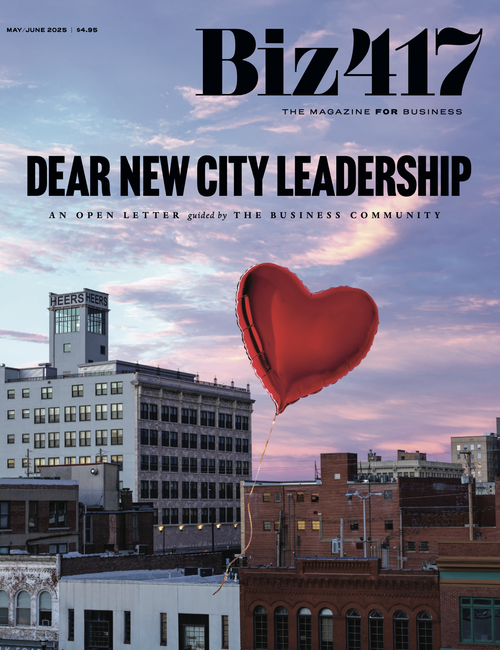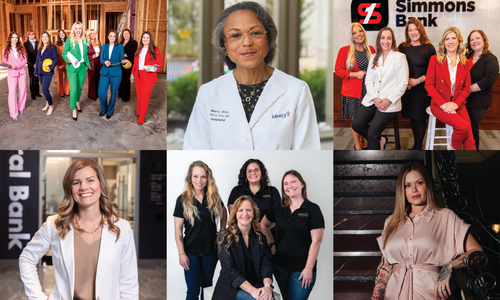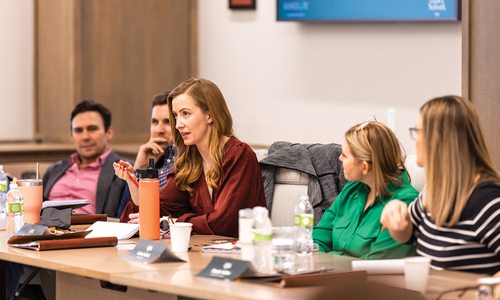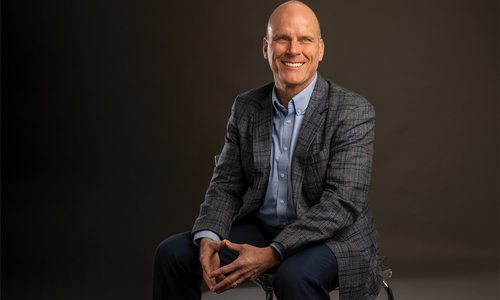
Leadership
Passing the Torch: Q&A with John Oke-Thomas
This month John Oke-Thomas of Oke-Thomas + Associates, Inc., steps into the role of Chairman of the Springfield Area Chamber of Commerce Board of Directors. He’s taking over for Biz 417 Publisher Logan Aguirre, whose tenure has just ended.
by Logan Aguirre
Jan 2022

Logan Aguirre: We’ve had a few “firsts” in the last couple of years for Chamber Chairmen. Robin Robeson and I were the first back-to-back female Chairmen, and you will be our first African American Chairman. Tell me about the significance of that to you.
John Oke-Thomas: I think it is recognition that Springfield is taking seriously the diversity and inclusion that we’ve been talking about for a while now. And part of that is to ensure that all of the voices are participating in the process.
L.A.: You are a business owner, were a founding member of the Multicultural Business Association and have served on the Chamber board twice before. When you get phone calls asking you to step into these roles, what makes you continue to say yes?
J.O.: Well I’ve believed strongly that you have to make an impact in whatever community you’re in. And making an impact requires you to make the sacrifice that is necessary in order for you to articulate what your position is and also help continue to build the community.
L.A.: That’s kind of how I feel too. If you really are invested in a place, then you put in the time, and you put in the energy. It’s easy to sit around and say, “Why isn’t it like this?” or “Why can’t we do this?”
J.O.: That’s exactly it, you know. We have a lot of what I’ll call armchair referees, but at some point you have to step in there and roll up your sleeves and make it work instead of complaining about it.
L.A.: I’m curious if you have any goals for your chairman year that you’ve thought of that you’d want to share.
J.O.: My goal at this point is to continue to move forward with the programs and the opportunities that the chamber has to offer and also ensure that we continue on the diversity and inclusion initiatives that we started. It is not enough to be diverse. It is also necessary and required that we be inclusive as well…. And continuing to emphasize the so-called non-college individuals—recognizing that not everyone wants to go to college and not everyone is interested in going to college. So how do we make sure that those who are not college-bound have the opportunities and the know-how to allow them to move into the type of trades that do not require a college education? Because at the end of the day, the more people we can move into the middle class, the better the society is going to be... We have to make the necessary investment to make sure that those in that circumstance are not a lost generation. Because eventually society will pay the price. How do we make sure that we stop the cycle and move to a better place?
L.A.: Your story is really incredible about growing up in Lagos, Nigeria, then moving to Italy, France and then England. And then you went to University of Kansas?
J.O.: I got admitted to University of Kansas, but I did not actually go there because when I got to Lawrence, Kansas, there were just too many students. I was looking for a college or university that was as small as the one I went to in London. One of my friends said, “There’s a college in this small town of Springfield, Missouri, that you might want to take a look at. So I drove down to Springfield, met with the administration office over at Drury which was called Drury College at that time. They told me they had just started the architectural program there, and it had the student to professor ratio that I was looking for. So I sent in all my documents, and I was admitted, and that’s how I got to Springfield.
L.A.: Talk to me a little bit about your friendship with Dr. John Moore, who was president of Drury when you started there and has been your mentor ever since.
J.O.: My very first day at Drury I was introduced to him. He was very, very receptive and very encouraging and basically told me if I need anything at all I should just knock on his office door. His door is always open… I was a little bit surprised by that, and I didn’t think he meant it until we met again about a week or so later, and he goes, “You haven’t shown up yet. I told you to come see me anytime.” Since then we’ve been kind of in and out and talking back and forth, and then when I graduated and started my own business, I went over to see him just to let him know that I had started my business, and he was very complimentary and said, “Whatever Drury can do to help.” And in the process, they gave me my first contract at Drury to design an entrance to a warehouse that they have on Clay Street. We designed it and everybody was very complimentary, so later they called me for a second project, and we were just on and on like that from one project to another. But what stood out to me was it wasn’t just a business relationship. It was more or less a mentor-friendship relationship. He will call to ask about my wife, to ask about my children. Even when my children were growing up, I made it a point to take them to see him, and he would give them all kinds of advice on how to continue to stay in school and be as great as they want to be—the sky is the limit, and all of these type of conversations that you would normally have with your children or grandchildren. Not only that but up until today my kids still remember him.
When he left Drury after finishing his term there, he decided that he was going to help me with marketing in my business. He took me to several school superintendents in and around Springfield and the metro areas and introduced me to them just to let them know that I am one of the architects in town. That if ever they need an architect they should consider me. I was very very taken aback by his dedication. Even when I offered to pay him for that he was like, “No, no, no.” He was just doing whatever he could to help. He was very well appreciated and coincidentally when my wife became a nurse practitioner, Cox hospital opened a clinic at Drury, and my wife was selected to be the one to manage the clinic. And even though he was retired, he would go there. He would bring us a jar of honey because at that time he had become a beekeeper.
L.A.: Retirement goals right?
J.O.: Retirement goals, yes! He would bring us a jar of honey, and I mean all he wanted to know was how we are doing and what the kids are doing. I just don’t know how to thank him enough for what he’s done. You know, I tell people that if it wasn’t for him, I would not be where I am today. I’m not just saying that for the sake of saying it. The bottom line is it is the type of projects that we did for Drury that put us on the map because we were able to get the needed experience and expertise to go out and say, “We have done this. We have done that.” So in a sense, I cannot say that I am where I am without at least acknowledging the fact that he was instrumental in getting us to where we are today.
L.A.: When you think about what he did for you, does that inspire you? Is there anyone that you’ve been able to mentor in a similar way?
J.O.: That was one of the motivations for starting Minorities in Business because the goal of Minorities in Business when we started was not just networking but also capacity building and mentorship. And out of that, I felt very strongly that I needed to give back in the process. And that meant that I had to do what I could to help up-and-coming especially minority-owned businesses in order to be able to give them what my experience has been and help them along the way—so that they know there is somebody in their corner that can help them to navigate all the pitfalls of business startup and business relationships. Part of that of course is to help them to know what they can do and what they cannot do and how they can take advantage of the opportunities that are out there. Making sure they are registered as minority-owned businesses so they are able to present themselves or at least take advantage of the programs that are out there. So making sure they register. Making sure we introduce them to public and private entities so they can explain what they do, market themselves in such a way that they would be able to get a contract or make a sale. That is one of the things that motivated me to be able to do that, because someone did it for me. I felt that the responsibility of ensuring that I pass on that gift so that other people can be able to benefit from it. And that’s what I still do, to continue to pass on the knowledge and the seed so that other businesses can attain the same opportunity and growth for that.












